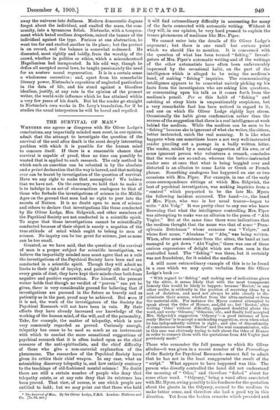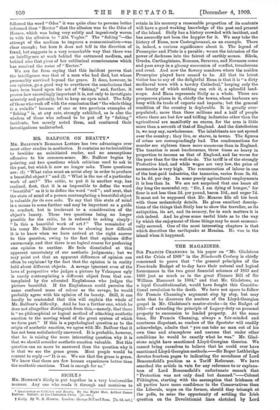THE SURVIVAL OF MAN.*
Warrnea one agrees or disagrees with Sir Oliver Lodge's conclusions, any impai tially minded man must, in our opinion, admit that the attempt to investigate the question of the survival of the soul after death is the most deeply interesting problem with which it is possible for the human mind to concern itself. If there is a reasonable chance that survival is capable of proof, then no time can possibly be wasted that is applied to such research. The only method in which such an assertion can be rebutted is by the absolute and a priori declaration that the way is barred, and that nothing ever can be learnt by investigation of the question of survival. Have we any right to make that assumption ? We believe that we have not. On the contrary, we hold that to make it is to indulge in an act of obscurantism analogous to that of those who forbade the investigations of science in the Middle Ages on the ground that man had no right to peer into the secrets of Nature. It is no doubt open to men of science and others to declare that investigations like those conducted by Sir Oliver Lodge, Mrs. Sidgwick, and other members of the Psychical Society are not conducted in a scientific spirit. To argue that those investigations cannot be scientifically conducted because of their object is surely a negation of the true attitude of mind which ought to belong to men of science. No inquiry can be too great for science, just as none can be too small.
Granted, as we have said, that the question of the survival of man is a proper subject for scientific investigation, we believe the impartially minded man must agree that as a rule the investigations of the Psychical Society have been and are conducted in a scientific spirit. Though they will admit no limits to their right of inquiry, and patiently sift and weigh every grain of dust, they have kept their minds clear both from negative and positive superstition. For himself, the present writer holds that though no verdict of " proven " can yet be given, there is very considerable ground for believing that if investigations are pursued in the future as bravely and as patiently as in the past, proof may be achieved. But even if it is not, the work of the investigators of the Society for Psychical Research will not have been in vain. By their efforts they have already increased our knowledge of the working of the human mind, of the will, and of the personality. Take, for example, the matter of telepathy, which is now very commonly regarded as proved. Curiously enough, telepathy has come to be used so much as an instrument with which to combat the more sensational suggestions of psychical research that it is often looked upon as the chief resource of the anti-spiritualists, and the chief difficulty of those who give a non-material explanation of the phenomena. The researches of the Psychical Society have given its critics their chief weapon. In any case, what an astonishing discovery telepathy is, and how entirely contrary to the teachings of old-fashioned mental science ! No doubt there are still a certain number of people who deny that telepathy exists, or at any rate deny that its existence has been proved. That view, of course, is one which people are entitled to hold; but we may point out that those who hold
• The Survival of Man. By Sir Oliver Lodge, F.B.S. London: Methuen and Co. [7e. 6d, net.] it will find extraordinary difficulty in accounting for many
of the facts connected with automatic writing. Without it they will, in our opinion, be very hard pressed to explain the trance phenomena of mediums like Mrs. Piper.
We cannot enter into the details of Sir Oliver Lodge's argument; but there is one small but curious point which we should like to mention. It is concerned with
the question of what has been termed " fishing." Investi- gators of Mrs. Piper's automatic writing and of the writings
of the other automatists have often been unfavourably impressed by the occasional habit, on the part of the intelligence which is alleged to be using the medium's band, of making " fishing" inquiries. The communicating
intelligence appears to be somewhat naively picking up his facts from the investigators who are asking him questions, or commenting upon his talk as it comes forth from the medium's pencil. Per se this habit of " fishing " and
catching at stray hints is unquestionably suspicions, but a very remarkable fact has been noticed in regard to it, and one on which Sir Oliver Lodge rightly lays stress. Occasionally the habit gives confirmation rather than the reverse of the suggestion that there is a real intelligence at work behind the medium. While the medium can be seen to be " fishing " because she is ignorant of what she writes, the sitters, better instructed, catch the real meaning. It is like what
happens when one sometimes hears a not very well-instructed reader puzzling out a passage in a badly written letter. The reader, misled by a mental suggestion of his own, or of some ignorant person who volunteers a remark, concludes that the words are so-and-so, whereas the better-instructed reader sees at once that what is being boggled over and distorted is an allusion to some Latin or Greek or French phrase. Something analogous has happened on one or two occasions with Mrs. Piper. For example, in one of the early cross-correspondence sittings at which Mrs. Sidgwick, the best of psychical investigators, was making inquiries from a. " control" which purported to be the late Mr. Myers the following incident occurred. The hand—i.e., the hand
of Mrs. Piper, who was in her usual trance—began to write " Abt Volg." It was pretty clear to any one who knew Browning that what the intelligence controlling Mrs. Piper was attempting to make was an allusion to the poem of " Abt Vogler." But at the same time there were indications that the medium thought that the name was that of some " Penn- sylvania Dutchman" whose surname was " Volger," and whose first name, " Abraham " or "Abe," was being written. When, after some assistance from the sitter, the band at last managed to get down "Abt Vogler," there was one of those curious expressions of delight which are often seen in the controlled hand. The " fishing " was there, but it certainly was not fraudulent, for it misled the medium.
A. still more extraordinary example of this is to be found in a case which we may quote verbatim from Sir Oliver
Lodge's book :—
" With regard to fishing' and making use of indications given by the sitter, it seems likely that with the moat transparent honesty this would be likely to happen : because Rector,' or any other scribe, is evidently in the position of receiving ideas by a sort of dictation, and need not always be able clearly to dis- criminate their source, whether from the ultra-material or from the material side. For instance the Myers control attempted to speak about the Odes of Horace, and.did so; but Rector,' after writing ' Odes' without difficulty, appeared doubtful about the word, and wrote 'Odessus,"Odesesis,' etc., and finally half accepted Mrs. Sidgwick's suggestion Odyssey '—a good instance of how ready 'Rector' is to accept a misleading suggestion, even when what he has independently written is right ; and also of discontinuity of consciousness between Rector' and the real communicator, who in this ease was obviously trying to talk about the Odes of Horace in order to connect them with the quotations from Abt Vogler just previously made?'
Those who remember the full passage to which Sir Oliver alludes—it was given in a recent number of the Proceedings
of the Society for Psychical Research—cannot fail to admit that he has not in the least exaggerated the result of the " script." What appears to have happened was this. The person who directly controlled the hand did not understand the meaning of " Odes," and therefore "fished" about for some other word. " Odyssey," being a word often associated with Mr. Myers, owing possibly to his fondness for the quotation about the ghosts in the Odyssey, seemed to the medium to make better sense, and therefore she had a good try in this direction. Yet from the broken remarks which preceded and
followed the word " Odes" it was quite clear to persons better informed than " Rector" that the allusion was to the Odes of Horace, which was being very subtly and ingeniously woven in with the allusion to " Abt Vogler." The " fleshing "—the attempt of the medium to improve a communication—was clear enough; but here it does not tell in the direction of fraud, but suggests in a very remarkable way that there was an intelligence at work behind the entranced medium, and behind also that piece of her subliminal consciousness which has received the name of " Rector."
We are far from saying that this incident proves that the intelligence was that of a man who had died, but whose personality survived beyond the grave. It does, however, in our opinion, go a good way to overthrow the conclusions that have been based upon the act of "fishing," and, further, it proves how exceedingly important it is, not only to investigate minutely and patiently, but to keep an open mind. The folly of those who rush off with the conclusion that "the whole thing is a swindle" because of one or two previous examples of " fishing " is, at any rate, strongly exhibited, as is also the wisdom of those who refused to be put off by " fishing " incidents, but merely noted them, and continued their investigations undisturbed.







































































 Previous page
Previous page